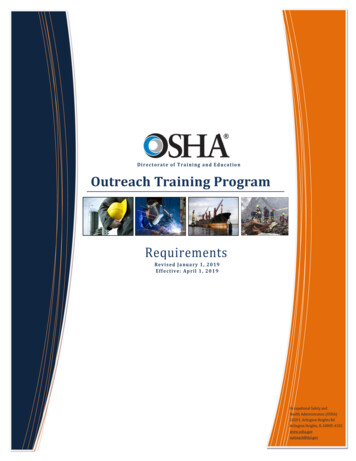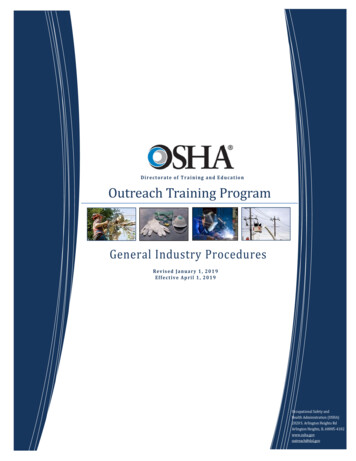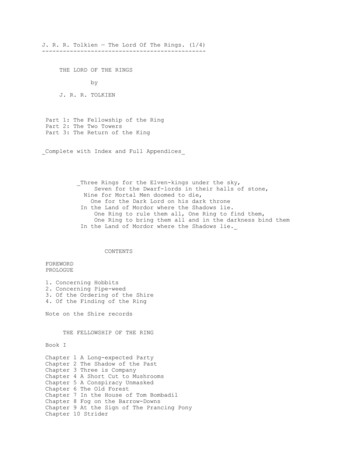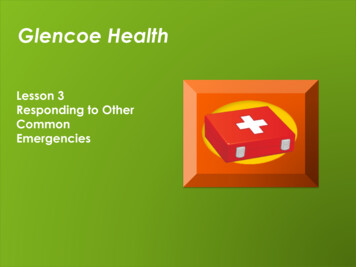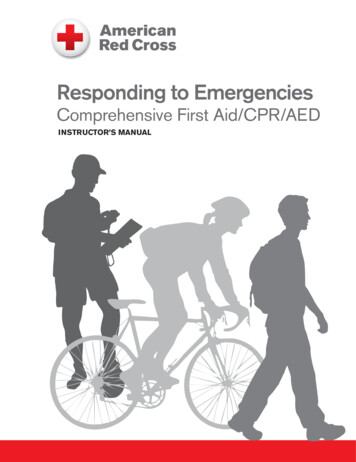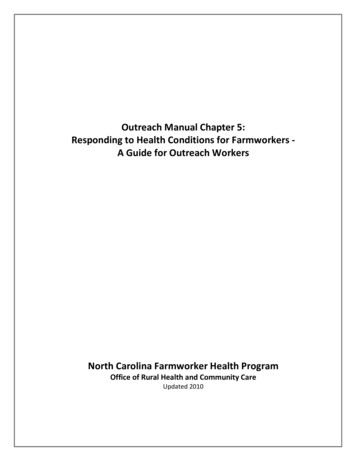
Transcription
Outreach Manual Chapter 5:Responding to Health Conditions for Farmworkers A Guide for Outreach WorkersNorth Carolina Farmworker Health ProgramOffice of Rural Health and Community CareUpdated 2010
How to Use this GuideThis guide has been developed with the purpose of providing protocols and procedures thatoutreach staff can follow when responding to specific health conditions and illnesses experiencedby migrant and seasonal farmworkers. Many lack access to care due to multiple barriers, and theirnursing or outreach visit may be their only contact with the health system, for major and minorillness care.The guide can also assist outreach staff in conducting health assessments, providing healtheducation, and/or responding to immediate adverse health events, such as an asthma attack, heartattack, etc. It lists the typical symptoms of common problems, the danger signs that suggest theneed for immediate medical attention, useful over-the-counter treatments, and self-caretechniques.Since some outreach workers are not medically trained, they should refrain from diagnosing acondition and/or providing medical care. Make sure you know who you can call if you havequestions or problems arise. One good resource for outreach workers are nurses.Registered nurses (RNs), in particular, are trained to make nursing assessments and to followorders appropriate to those assessments. RNs can provide basic health advice concerning self-careand the appropriate use of over-the-counter (OTC) medication to treat common symptomsexperienced by farmworkers. They also can assess the farmworker to determine if consultation orreferral is indicated.Please review the guide with your supervisor to assure they are in accordance with your center’spolicies and procedures. Some programs do allow outreach workers to distribute anti-fungalcreams for self-identified fungal infections, 1% hydrocortisone cream for itchy rashes related totobacco harvesting, and medications such as Dramamine for green tobacco sickness preventionand treatment. Some allow distribution of first aid kits with health education. Other programsrestrict this activity.Remember to always follow your agency policies on how to respond to health conditions in yourarea.For more information and/or questions regarding these guidelines, please contact:NCFHP’s Medical DirectorNorth Carolina Farmworker Health Program2009 Mail Service CenterRaleigh, NC 27699(919) 733-2040
Summary of North Carolina Regulations Regarding Recommendation and Dispensing ofMedicationsMedical assistants and others who work for a physician and do not have independent licensingboards are covered under the medical practice act. Physicians may delegate “to a qualified personany acts, tasks, and functions that are otherwise permitted by law or established by custom.” Thisperson is then functioning as an extension of the physician, who is liable for their actions. (MedicalPractice Act 90-18)This regulation can be used to allow outreach workers to give out first aid kits (and possibly otherOTC medications, for example Miconazole cream for athlete's foot) if this activity is delegated by aphysician. The physician and the outreach worker must have a close working relationship, and thephysician must be sure the outreach worker has appropriate training. Outreach workers caneducate farmworkers about the use of first aid kit items, and teach them how to prevent and treatcommon ailments and discomforts experienced by farmworkers.Outreach workers who are not licensed as nurse practitioners, physician assistants, or physiciansshould avoid “practicing medicine”, which involves diagnosing, treating or prescribing for a specificmedical condition in a specific farmworker. Practicing medicine without a license is a Class 1misdemeanor (Medical Practice Act 90-18).
TABLE OF CONTENTSHow to Use this GuideThe Health AssessmentWhen to Call 911Remember the First Aid Kit!Protocols and Procedures for Specific Health Conditions Allergic Reactions Asthma Back Pain Chest Pain Dental Pain Diabetes Diarrhea Fever Fainting Green Tobacco Sickness Headache High Blood Pressure Heat-Related Illness Pesticide Exposure Rash on body Rash on feet Rash in groin Respiratory Symptoms, Allergy Respiratory Symptoms, Upper Respiratory Infection Seizures Substance Abuse: Alcohol Upper Abdominal Pain Vitamin Request Wound Care
The Health AssessmentWhen outreach staff comes into contact with farmworker families, a health assessment must beconducted for each person, including women, children and adolescents.As an outreach worker conducts the health assessment using the appropriate health assessmentform, he/she may learn of health conditions that farmworkers are experiencing. Some of thesehealth conditions may need immediate attention and others may simply require health education.Some conditions may be reported by the farmworker. Other conditions may be observed by theoutreach worker.On occasions, the outreach workers need to gather more information on certain health conditionsand ask more probing questions. See the Advanced Health Screening Questions section of thisguide for a list of such questions according to the health condition.When assessing a farmworker with a health concern and/or responding to an adverse health event,it’s good practice to:1. Always use precautions (latex gloves, mouth guards used for mouth-to-mouth resuscitation,etc) to avoid coming into contact with any bodily fluids, such as blood, saliva, stool, etc.2. Ask about allergies and current medications.3. Ask about current medical problems. If the farmworker has kidney failure, consult amedical provider prior to recommending any oral medications such as ibuprofen. If HIV,diabetes, asthma or heart disease, consult provider immediately for any infection,respiratory symptom, or chest discomfort.4. Ask women about the possibility of pregnancy, or if they are breastfeeding.5. If the farmworker has symptoms of cough and fever lasting over 3 week, they may havetuberculosis. Whenever possible, work outdoors. If you must be indoors or in a car, wear aTB mask, if available. If you do not have a TB mask, then both you and the farmworkershould wear a surgical mask and minimize the time you spend together in an enclosed area.6. If the farmworker appears ill or if you are concerned about their symptoms, recommend orarrange for further evaluation.When a health event occurs that needs immediate emergency care, the outreach worker must nothesitate in calling 911.
When to Call 911If you come upon an emergency, follow the 3 steps: Check the scene and the victim Call 911 Care for the victim.Call 911 for an ambulance if a person or Farmworker has the following symptoms and no medicalproviders are available to assist in the evaluation. Unconsciousness, confusion, or decreased level of consciousness Severe trouble breathing or abnormal breathing Persistent pain or pressure in the chest Pain or pressure in the abdomen that does not go away Vomiting or passing blood Seizures which are unusual for the Farmworker, severe headache, or slurred speech Sudden onset of weakness in part of the body Injuries to the head, neck, or back Poisoning: if the Farmworker is not having any symptoms, you may call poison control first at1-800-848-6946. Obtain all information about the poison, including the bottle, label, and anyremains of the material in question. Be prepared to give your location, telephone number, your name, and a description of theproblem. Follow instructions given by the dispatcher. Do not hang up first. They will tell you whento hang up.While you wait, do the following: Assure the safety of the Farmworker, bystanders, and staff Clear a passageway for emergency vehicles Administer CPR or first aid if they are needed and you are trained to do so. Special SituationsIf a person or Farmworker is suicidal, keep talking to them while another staff member calls 911.If they are on the telephone, attempt to obtain their address and telephone number. If you areunsuccessful in getting this information before the Farmworker hangs up, call the telephoneoperator immediately to obtain the telephone number. Then call 911 with all the information.If a person or Farmworker threatens to become violent (intends to harm you or someone else),notify your supervisor and attempt to clear non-essential persons from the area immediately. Ifyou are in danger, leave the area and call 911. If you are not in immanent danger, try to calm theFarmworker while another staff member calls 911.Call 911 for fires, explosions, presence of poisonous gas, and any other emergencies.Call 911 if you see any signs of suspicious or toxic materials; “meth lab” odor or emissions.
Remember the First Aid Kit!It is recommended that outreach staff have a First Aid Kit with them at all times or in their car.Outreach staff may also deliver first aid kits containing the commonly used over the counter (OTC)medications to farmworker camps. This activity can be combined with the provision of healtheducation on how to treat common health conditions farmworkers experience. As this activity isnot to be connected to an individual farmworker’s diagnosis and treatment, most programs arecomfortable with this being done by outreach workers.There are many ways in which outreach staff can obtain medications for first aid kits. If you decideto purchase items, health departments and community health centers can receive public healthpricing when ordering medications. Pharmaceutical representatives will often supply free Tylenol,Advil, and cough syrups in sample-sized packages. Many churches (youth, women or auxiliarygroups), volunteer groups, and other agencies will assemble first aid kits for you to distribute.If there are children in the camp, you need to take extra precautions. Ensure medications are inchild-resistant containers, and instruct farmworkers to keep the first aid kit out of the reach ofchildren. You may want to return with a cabinet child-proofing device if they do not have one.See Appendix II: Field Kits for a list of medications and items to include in your kit.
Protocols and Procedures forSpecific Health Conditions(In alphabetical order)
ALLERGIC REACTIONSASSESSMENT: Farmworker-reportsThe Farmworker is exposed to something (a vaccine, a medication, an insect sting), and develops any of thefollowing symptoms within the next hour: trouble breathing feeling of tightness in the chest or throat swelling of the face, neck, and tongue rash, hives, dizziness, or confusion You Observe:Farmworker may develop a rash, facial swelling, wheezing, inability to breathe, tachycardia, or hypotension.RESPONSE:1. Call 911 immediately and tell them you have a Farmworker with a severe allergic reaction whomay need epinephrine. This is a medical emergency!2. Medical regimen: If a First Aid Kit is available containing epinephrine, help him or her to use itaccording to instructions.3. Monitor vital signs (pulse, breathing, blood pressure) until EMS arrivesFOLLOW-UP:1. As directed by medical provider.2. Educate about avoidance of allergens and use of prescribed medications.3. Educate in use of epinephrine kit if prescribed.Source: First Aid Fast, by the American Red Cross
ASTHMAASSESSMENT: Farmworker ReportsFarmworker reports a history of asthma in themselves or their childrenRESPONSE:1. Ask the following questions: Do they use medications every day? If so, what medications?Do they wheeze or feel short of breath every day, even while taking medications?If they feel well, will they run out of medications before the end of the season?2. Arrange a medical visit for all people with asthma who need daily medications or who havesymptoms more than twice a week unless they refuse: Within 1 month if they have enough medication and are feeling wellAs soon as possible if they do not meet the criteria above.3. Remind them to take all medication and packaging with them to each clinic visit. The packaging is particularly important if the medication is from another country, as it maycontain the generic names and doses of the medication.A review of the actual inhalers and medication bottles allows the provider to check forduplicate and missing medication, to see how many refills remain for each medication, andto see when the bottle was last refilled to tell them how often the Farmworker is using theirmedication.If the farmworker will run out of medication, try to obtain a refill for them before the clinic visit.Make sure they receive a flu and H1N1 (if applicable) shot between October and February! You ObserveIf a farmworker with asthma complains of shortness of breath that lasts more than 15 minutes and does notrespond to their medication while you are seeing them, help them see a doctor right away. They may behaving an asthma attack. Asthma attacks can kill, and are much easier to treat if caught early.RESPONSE:Call 911 immediately and tell them you have a farmworker that is having an asthma attack. This is amedical emergency! Self-care: Do not smoke, and stay away from tobacco and other types of smoke. Minimize exposure to dust, pollen, animal dander, chemicals, and anything that makes themwheeze or feel short of breath. Practice good hygiene and frequent hand washing to avoid colds and flu.
BACK PAINASSESSMENT: Farmworker ReportsFarmworker reports pain in lower or upper back after working in fields. Usually better when lying down,worse when sitting or standing for long time periods. You ObserveLook for abnormal gait, slowed or painful movementsRESPONSE1. Call provider/ urgent visit if: fever, leg weakness, leg numbness, problems with (inability tocontrol) bladder or bowels, acute injury involving force (fall, car accident, farm accident).Advise a routine clinic visit if Farmworker requests or if there is moderate discomfort.2. Medical regimen: Ibuprofen 200 mg 2 tablets every 4 hours if no contraindications (contraindications includeulcer/gastritis/esophagitis; pregnancy; allergy to aspirin, ibuprofen, or NSAIDs) If contraindications, use acetaminophen in available dosage strength- Acetaminophen 325 mg 2 tablets every 4 hours- Acetaminophen 500 mg 2 tablets every 6 hours In addition, Farmworker may apply analgesic balm/cream every 4 hours as needed.3. Follow-up with clinic/provider if not better in 2 weeks. Instruct Farmworker to call or seeprovider urgently if fever, leg weakness, leg numbness, or problems with bladder or bowel occur. Self-care:Educate on proper lifting techniques, body mechanics, and use of heat or ice, back exercises.
CHEST PAINChest pain can be the first and only sign of a heart attack, and must be taken seriously. Many Farmworkerswill need to go to the Emergency Room via ambulance, because it is difficult to rule out heart attack,pulmonary embolism, or other severe pathology in the field.ASSESSMENT: Farmworker ReportsChest pain right nowRESPONSE: Call 911 right away for most Farmworkers who have chest pain while you are seeing them,especially for men 40 and women 50 Farmworker ReportsRecent chest pain which is not there anymore, especially if they had shortness of breath, dizziness,sweating or nausea with the painRESPONSE: ER visit right away-Recent, new onset chest pain require an ER visit unless they have obvious chest walltenderness, pain is reproduced by a single movement of the arm, OR you consult a providerand they advise otherwise Farmworker ReportsYoung age, with good general healthVery brief – moments to minutes – chest painPain mostly when they move their arms or their bodyPain is increased when they push on their chest wallNo shortness of breath, dizziness, radiation to arm or jaw, sweats, or nauseaRESPONSE: Refer to clinic visit
DENTAL PAINASSESSMENT: Farmworker ReportsFarmworker complains of pain in teeth or jaw. You ObserveSwelling or fever may be present, indicating active infection.RESPONSE:1. Urgent visit to dentist if swelling of jaw, pus or swelling visible around tooth line, fever, orsevere pain. If not dentist available, a medical provider can prescribe antibiotics for theinfection.Refer to routine dental visit if mild or moderate pain.2. Medical regimen pending dental visit (choose one): Ibuprofen 200 mg 2 tablets every 4 hours if no contraindications (Contraindications includeulcer/gastritis/esophagitis; pregnancy; allergy to aspirin, ibuprofen, or NSAIDs) If contraindications, use acetaminophen in available dosage strength- Acetaminophen 325 mg 2 tablets every 4 hours- Acetaminophen 500 mg 2 tablets every 6 hours3. Follow-up: return to dentist if pain persists more than a week after visit. Self-careFrequent mouth rinses with warm salt water, or with hydrogen peroxide mixed with water in a 1:4 ratio.Warm compresses to jaw.Get dental care at least once a year. This includes: a dental exam, dental varnish application (for children),and dental health education.
DIABETESASSESSMENT: Farmworker ReportsFarmworker reports that he/she has diabetes.RESPONSE:1. Ask the following questions: Do they have symptoms of diabetes, like excessive thirst, frequent urination, blurred vision,and fatigue? Are they checking their blood sugar, and what levels they are obtaining?Goal blood sugar: fasting blood sugar 120; 2 hours after eating blood sugar 140 Are they taking any medications, and will they need more before the end of the season? Are they having symptoms of hypoglycemia or low blood sugar? (hungry, shaky, sweaty,dizzy, nervous, sleepy, confused, weak, or difficulty speaking)2. Test their blood sugar if you are able to do so or make referral to testing site.3. Arrange a medical visit for all people with diabetes so they can have their tetanus shot andpneumococcal vaccine, blood work, and other examinations: Within 1 month if they have enough medication, are feeling well, and blood glucose is 200. As soon as possible if they do not meet the criteria above.4. Remind them to take all medication, bottles, and packaging with them to each clinic visit. The packaging is particularly important if the medication is from another country, as it maycontain the generic names and doses of the medication. A review of the actual medication bottles allows the provider to check for duplicate andmissing medication, to see how many refills remain for each medication, and to see whenthe bottle was last refilled as a gauge of medication adherence.It is very important for the Farmworker to take all medications on the day of their clinic visit, so that theprovider can determine if the dose is correct. If the Farmworker will run out of medication, try to obtain arefill for them before the clinic visit. Help them get a flu shot every fall. You ObserveIf a farmworker with diabetes complains of chest pain or shortness of breath lasting more than 15 minuteswhile you are seeing them, call 911. They may be having a heart attack.If they have nausea, vomiting, dizziness, weakness, or extreme fatigue, help them see a doctor immediately. Self-care Avoid concentrated sweets (sodas, sweet tea, fruit juice and fruit drinks, candy, desserts), fatty or greasyfoods, and alcoholic beverages. Eat high fiber foods like vegetables, whole grains, and up to 2 fruits perday. Drink water, 1% or skim milk, or diet drinks.Exercise for 30 minutes 5 times a weekReduce their weight by at least 10 pounds if overweight, or ideally to a body mass index of 24 or less.Check feet for sores or lesions every day. Eye exam or retinal screen annually.
DIARRHEAASSESSMENT: Farmworker ReportsFour or more loose stools daily; often associated with nausea, vomiting, abdominal cramps, and fever. You ObserveFarmworker with mild diarrhea will look healthy. Farmworker with severe diarrhea may have findings listedbelow.RESPONSE:1. Call provider or arrange urgent visit if: Vomiting or fever over 100.4 F lasts more than one day Over ten stools per day Black or bloody stool Severe abdominal pain Signs or symptoms of dehydration (dry lips/mouth, dizziness, urination less than once every8 hours, loose skin, sunken eyes, fallen fontanelle).Routine visit if Farmworker requests or diarrhea lasts more than one week.2. Medical regimen: Small frequent sips of clear fluids: Oral Rehydration Solution (ORS) is ideal [recipe, packets,or ready-made (Pedialyte and others)]. Diluted sports drinks or fruit juice, flat Coke orginger ale, tea, and broth may be used if symptoms are mild. Bland solid foods as tolerated for children and adults (bananas, rice, applesauce, toast,crackers, tortilla, potatoes). Advance quickly to normal diet once vomiting stops. Babies may continue breast-feeding. They may also take formula as tolerated. Acetaminophen in available dosage strength as needed for fever over 100.4 F.- Acetaminophen 325 mg 2 tablets every 4 hours- Acetaminophen 500 mg 2 tablets every 6 hours3. Follow-up:Refer to clinic/provider if diarrhea not resolved in two weeks. See provider urgently if any of thefollowing symptoms develop: vomiting or fever over 100.4 F lasting more than one day; black orbloody stool; severe abdominal pain or tenderness; signs or symptoms of dehydration. Self-careTeach signs and symptoms of dehydration (dry mouth, dizziness, urination less than once every 8 hours,loose skin, sunken eyes, fallen fontanelle) – seek medical care immediately if these occur.Advise frequent handwashing after each trip to the toilet or diaper change, and before and after eating orfood preparation. Check kitchen for sanitation concerns such as mayonnaise in the cabinet rather than therefrigerator, food left out on the counter overnight, etc.ORS Recipe:1 liter clean water2 level tablespoons sugar¼ teaspoon salt and ¼ teaspoon baking soda (½ teaspoon salt if no baking soda available)½ cup orange juice or mashed banana for flavorTaste to make sure it is no more salty than tears, then drink sips every 5 minutes until urinating normally.(Where ThereIs No Doctor)
FEVERYOU WILL NEED TO CONSULT WITH A HEALTH CARE PROVIDER IF YOU SEE A FARMWORKER WITH FEVER IN THE FIELD. ASK THEQUESTIONS BELOW AND MEASURE THEIR TEMPERATURE BEFORE CALLING.Background information: North Carolina has the highest incidence of Rocky Mountain spotted fever in thecountry. This tick-borne rickettsial illness can be deadly, and presents with fever, headache, and bodyaches. In general, these symptoms during times of year when ticks are present require referral to a healthcare provider. The usual treatment is with doxycycline unless contraindicated.Some people with fever have a mild viral infection that will go away on its own, while others have a lifethreatening illness.ASSESSMENT: Farmworker ReportsFarmworker reports fever You ObserveMeasure farmworker’s temperatureRESPONSE:1. Find out how high the temperature has gone and how long the person has had fever. Manypeople say they have fever, when actually they are experiencing headache, hot flashes, or any ofa number of other symptoms.2. Ask about associated symptoms such as headache, sore throat, cough, pain with urination, rash,abdominal pain. Ask what medications they have taken already (antibiotics, acetaminophen orTylenol, ibuprofen or Advil, etc.)Call the Ambulance if - fever headache stiff neck- confusion, weakness, farmworker looks very ill- shortness of breath- blood pressure less than 90 systolic in an adult with feverSend to Emergency Room if - Infant 3 months with fever unless caused by vaccine- Farmworker looks moderately ill or has symptoms and cannot go to clinic- Temperature T 105 F or higherArrange urgent medical visit if- Infant or child with T 104 F- Ill-appearing person of any age with T 100.4 F or higher- Most people with fever lasting more than 2 days should see a doctor Self-careGentle hydration, offer food as tolerated, acetaminophen or ibuprofen as needed, cooling baths or coolcompresses. Do not bathe children in alcohol, and do not give aspirin.
FAINTINGASSESSMENT: You ObserveFarmworker loses consciousness.RESPONSE:1. Elevate legs, loosen clothing2. Check if person is breathing and has a pulse. If no pulse or respiration, call 911 immediately andif trained, start CPR.3. Give nothing to eat or drink until fully awake and nausea resolved4. When awake, then assess need for further medical care-Ask about chest pain, shortness of breath, severe headache, focal weakness, head injury,heat illness, etc., and refer to ER if appropriate-If seizure activity is observed, follow seizure protocol-Older farmworkers should be checked by a medical providerIf ER visit or 911 not needed, farmworker should rest in shady area and drink fluids until fully recovered.If diabetic, check blood sugar if possible.(Loss of consciousness symptoms can appear similar for severe low and high sugar)If glucose 70 or below, or if cannot check blood sugar, give a “quick fix” food right away 2 or 3 glucose tablets ½ cup of any fruit juice or regular soft drink 1 cup of milk 5 or 6 pieces of hard candy 1 or 2 teaspoons of sugar or honey 1-2 packets of pancake syrup
GREEN TOBACCO SICKNESSExplain the symptoms of Green Tobacco Sickness (GTS) to Farmworkers, and the ways they can keepthemselves from becoming ill – see Health Education Module.ASSESSMENT: Farmworker ReportsFarmworkers will complain of nausea, vomiting, dizziness, weakness, or headache after working in tobacco.RESPONSE:1. Have the farmworker shower and change clothes before going to clinic or seeking medical care ifpossible. This removes the nicotine from their skin so they do not continue getting worse.2. Call provider or arrange urgent visit if farmworker has fever or bloody vomit, symptoms lastlonger than 2 days, or farmworker is very weak, dizzy, or seems very ill or uncomfortable.3. If there is any concern about pesticide exposure, follow pesticide protocol.4. If mild symptoms, set up routine visit if farmworker requests.5. Medical regimens:- Dimenhydrinate (Dramamine) 25 mg: 1 – 2 tablets every 6 hours- Meclizine (Bonine) 25 mg: 1 – 2 tablets every 6 hours- Diphenhydramine (Benadryl) 25 mg: 1 – 2 tablets every 6 hoursConsult with your medical director to choose a preventive medication to recommend. All threeare available over the counter, and some programs allow outreach staff to distribute a smallsupply of the chosen medication to farmworkers. Warn farmworker the medication will causedrowsiness.4. Follow-up with clinic/provider if not improved in 2 days. Self-careAdvise gentle hydration, rest. Counsel farmworker on measures to prevent GTS in the future, such asavoiding contact with wet tobacco, use of raincoat or long-sleeved shirt which is changed after the tobaccodries, and taking a cool shower as soon as possible after working.Those severely affected, who will not be driving or operating machinery, can be advised to take one tablet oftheir treatment medication prior to exposure, with a repeat dose immediately after work.See Health Module on Green Tobacco Sickness for more information and health education tips.
HEADACHEHeadaches are a common symptom, but occasionally are a sign of serious illness such as stroke, braintumors, or meningitis or other infections. Pesticide exposure, heat illness, and green tobacco sickness allcause headaches. Alcohol and caffeine withdrawal also can cause headaches. The following informationcan be given as health education if farmworkers bring up this subject. Danger signs and referral guidelinesare listed below.Tension type headaches cause mild to moderate band-like or squeezing pain in the temples and forehead,and are common with stress, exposure to sunlight, missed meals, or awkward postures.Migraine type headaches may be pounding, and often are associated with nausea, sensitivity to light orsound, and visual symptoms. People often go to bed with a migraine, and feel better when they wake up.ASSESSMENT: Farmworker ReportsDanger signs:- Weakness or numbness in part of the body- Difficulty seeing, talking, swallowing, or walking- “This is the worst headache of their life”.- Fever, facial pain, rash, confusion, or stiff neck are present You Observe-Farmworker looks sick, like they have any of the above listed symptoms but are unable to say so.RESPONSE:1. Call provider or arrange emergency room visit2. Arrange clinic visit if Farmworker has frequent or worsening headaches, if headache has lasted more than2 days, if pain is worse with coughing or sneezing, if Farmworker requests, or if headache is not gettingbetter with over the counter treatment.3. Medical regimen (choose one with medical director):- Ibuprofen 200 mg 2 tablets every 4 hours if no contraindications (contraindications includeulcer/gastritis/esophagitis; pregnancy; allergy to aspirin, ibuprofen, or NSAIDs)- If contraindications, use acetaminophen in available dosage strength- Acetaminophen 325 mg 2 tablets every 4 hrs (contraindications include liver disease/failure)- Acetaminophen 500 mg 2 tablets every 6 hours4. Follow-up to clinic/provider if headaches worsen or do not resolve in 2 days, or if fever, rash, stiffneck, or facial pain develop Self-careFarmworkers with mild, ordinary headaches may take over-the-counter pain medications as listed in theFirst Aid Kit Protocol. They should not take these more than 3 days per week.Many people can reduce the number of headaches they have with adequate rest, increased fluid intake,reduction of caffeine and alcohol intake, use of sunglasses when outdoors, regular schedule for meals andsleep, eating breakfast, massage of neck and shoulders.
HEAT CRAMPSASSESSMENT: Farmworker ReportsPainful muscle spasms, usually in the legs and abdomen You ObserveNormal temperature and vital signsRESPONSE:1. Begin self-care immediately. Do not give salt tablets. Seek medical attention if heat cramps do notresolve in one hour.2. Follow-up:Instruct in adequate hydration and rest periods. If Farmworker has been working in heat less thantwo weeks, need extra breaks until acclimatization takes pl
Responding to Health Conditions for Farmworkers - . Call 911 for fires, explosions, presence of poisonous gas, and any other emergencies. Call 911 if you see any signs of suspicious or toxic materials; "meth lab" odor or emissions. . First Aid Fast, by the American Red Cross .

